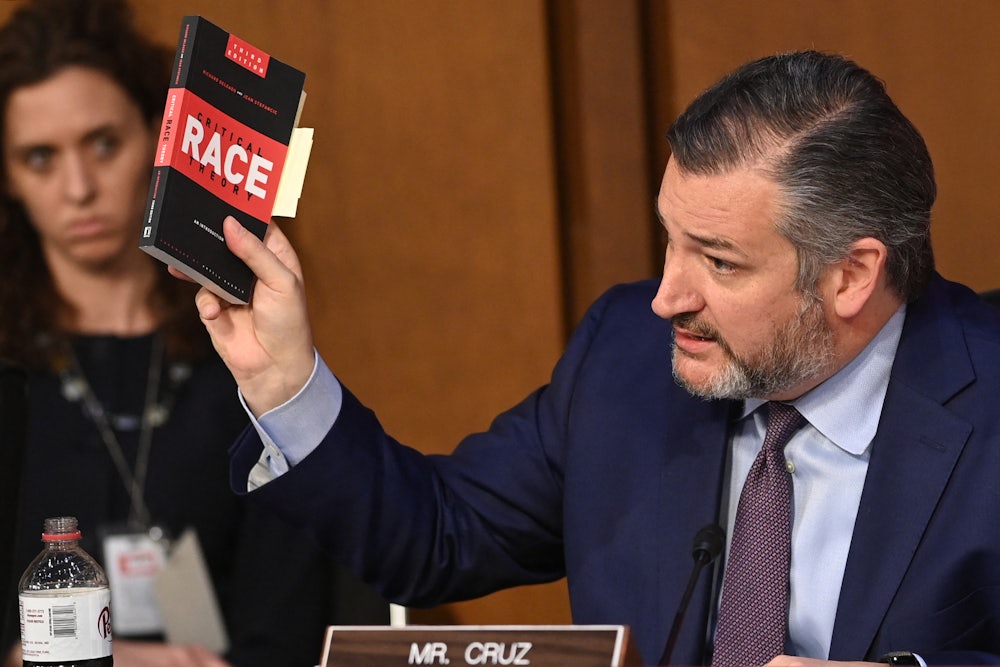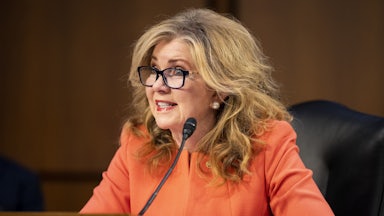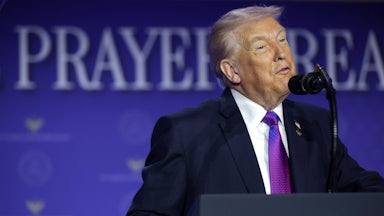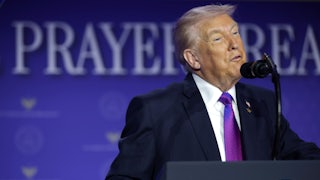It’s axiomatic among mainstream conservatives that schoolchildren must never be taught that American society harbors prejudice against Black people. Saying so, they believe, is as bad as racial prejudice itself. (Some secretly believe it’s worse!) These conservatives support their point by noting that Martin Luther King dreamed that one day Americans “will not be judged by the color of their skin but by the content of their character.” They would have you believe King wanted everybody to just forget about race. Which, of course, is a grotesque distortion. King was, among other things, an enthusiastic supporter of affirmative action.
Texas Republican Senator Ted Cruz invoked King Tuesday at the confirmation hearings of Ketanji Brown Jackson as a prelude to attacking Jackson for serving since 2019 on the board of Georgetown Day School, a private school in Washington, D.C.
Now, there was a time when conservatives attacked liberals like Senator Ted Kennedy for insulating their families from liberal policies that affect public schools—forced busing, for instance—by sending their kids to private schools. That criticism stirred some legitimate class resentment. But that isn’t what Cruz was doing. Instead, Cruz was delivering payback for criticism of Justice Amy Coney Barrett.
During Barrett’s confirmation hearings, the Associated Press reported that she’d served nearly three years on the board of Trinity School, a Christian academy in South Bend, Indiana, affiliated with the charismatic Christian group People of Praise. According to the AP, Trinity “effectively barred admission to children of same-sex parents and made it plain that openly gay and lesbian teachers weren’t welcome in the classroom.”
Barrett’s association with Trinity’s discrimination against LGBT parents and teachers never came up at her confirmation hearings in October 2020, a point that Cruz elided Tuesday in complaining that it drew “a great deal of attention.” Nonetheless, Senate Republicans were determined to make Jackson pay, at her hearings, for serving on a private school board of her own—that of Georgetown Day, known locally as GDS.
The ham-handed manner in which the Senate Republicans presented their case furnished some high comedy. On Monday, Tennessee’s Senator Marsha Blackburn shamed Jackson for praising “the transformative power of progressive education,” a perfectly anodyne quote that nonetheless mangled what Jackson really said. In a GDS publication, Jackson was quoted praising “the transformative power of a rigorous [italics mine] progressive education that is dedicated to fostering critical thinking [italics mine], independence, and social justice.” The next day, Cruz repeated the quote, getting it mostly right but still juking it a little by substituting the word interdependence (more rad-lib, he perhaps thought) for independence.
Next, leading with his chin, Cruz asked Jackson what she meant by “social justice.” Jackson thanked him for asking, then landed a nice clean roundhouse punch. GDS, she explained,
was founded, in 1945, in Washington, D.C., at a time in which, by law, there was racial segregation in this community. Black students were not allowed in the public schools to go to school with white students. Georgetown Day School is a private school that was created when three white families, Jewish families, got together with three Black families and said that despite the fact that the law requires us to separate, despite the fact that the law is set up to make sure that Black children are not treated the same as everyone else, we are going to form a private school so that our children can go to school together. The idea of equality, justice, is at the core of the Georgetown Day School mission.
Oof! GDS was, indeed, the first integrated school in the nation’s capital. The District of Columbia wouldn’t desegregate its public schools for another nine years, and then only because of the Supreme Court’s rulings in Brown v. Board of Education and Bolling v. Sharpe, a school desegregation case handed down the same day that addressed certain peculiarities unique to the District.
Cruz struggled to recover by changing the subject to critical race theory. Earlier he’d asked her whether critical race theory was taught in K-12. Jackson had replied that she didn’t know, and that it was her understanding critical race theory was taught mostly at the university level. Now Cruz said he found that
a little hard to reconcile with the public record because if you look at Georgetown Day School’s curriculum, it is filled and overflowing with critical race theory. Among the books that are either assigned or recommended, they include Critical Race Theory: An Introduction. They include The End of Policing, an advocacy for abolishing police. They include How to Be an Anti-Racist by Ibram Kendi.
Cruz reached triumphantly under his desk to produce copies of these texts. Among the books Cruz said he found “most stunning” was Anti-Racist Baby, also by Kendi. Cruz was so appalled by Anti-Racist Baby that he’d arranged to have parts blown up and mounted on an easel.
One part, Cruz said, read as follows: “Babies are taught to be racist or anti-racist. There is no neutrality.” In another part, he said, Kendi wrote: “They recommend the babies confess when they are being racist.” This book, Cruz said, is taught to GDS students from pre-K to second grade!
Perhaps you’re wondering what Anti-Racist Baby actually says. Cruz was correct in saying Kendi wrote that you can be taught to be racist or anti-racist. This is a message identical to that of “You’ve Got to Be Carefully Taught,” a show tune written in 1949 by those dangerous radicals Rodgers and Hammerstein. Kendi then writes that there are nine positive steps you can take. I’d be curious to know which ones Cruz deplores:
1. “Open your eyes to all skin colors”—i.e., don’t deny these differences exist because “they’re right in front of you.”
2. “Use your words to talk about race.”
3. “Point at policies as the problem, not people.”
4. “Shout, ‘There’s nothing wrong with the people!’”—i.e., we’re all brothers (and sisters) under the skin.
5. “Celebrate all of our differences.”
6. “Knock down the stack of cultural blocks” by appreciating that different groups “speak, dance, and create as they choose.”
7. “Confess when being racist.”
The word confess has religious overtones I don’t especially care for, but the idea is sound: We all of us say racist things now and then because we’re all imperfect, and the best thing to do is say you’re sorry, just as you do whenever you do anything wrong. Not that different from Parson Weems’s cherished myth about six-year-old George Washington chopping down his father’s cherry tree.
8. “Grow to be an antiracist.” Always be “learning, changing, growing.”
9. “Believe we shall overcome racism” because we all have “the power to transcend.”
Transcend is well outside the vocabulary of a second-grader, probably even at GDS, but who’s going to quarrel with the gospel anthem of the civil rights movement?
“Are you comfortable,” Cruz asked Jackson, “with these ideas being taught to children?”
Jackson began, “Senator,” then sighed heavily and paused for a few seconds in an admirable (if slightly theatrical) demonstration of forbearance. “I do not believe,” she said, “that any child should be made to feel as though they are racist or though they are not valued or though they are less than, that they are victims, that they are oppressors, I don’t believe in any of that.” As to whether critical race theory was taught at GDS, she said, “I don’t know, because the board does not control the curriculum.”
Cruz’s own two daughters attend St. John’s School, the elite Houston prep school on which Wes Anderson (St. John’s ’87) based his 1998 film Rushmore. Let’s look at its “Statement on Community and Inclusion.”
“For us,” the St. John’s statement reads, “community means respecting differences in ability, age, ethnicity, gender identity, race, religion and belief, sexual orientation, socioeconomic status, and thought.” But respecting these differences isn’t enough. St. John’s School listens, too. “A diversity of worldviews challenges us to consider other points of view.” To achieve that, St. John’s incorporates “cultural proficiency, diversity, global awareness, and inclusivity into all facets of the K-12 curricula and co-curricular activities.” There’s even a video.
My point is not to make fun of St. John’s. Rather, it’s to underscore Cruz’s hypocrisy. He sends his own children to a school that embraces pretty much the same exact ethic that Cruz pretends to be shocked by at GDS. There’s an awful lot of this diversity talk going around, and sometimes schools, especially the more expensive private schools, will lay it on a bit thick. But the goal is entirely praiseworthy: to increase mutual tolerance and understanding among people whose differences can’t really be ignored.
How’s it going at St. John’s? In December, the older of Cruz’s two daughters (she’s about 13) said of her father on TikTok: “I really disagree with most of his views.”
Score one for “the transformative power of a rigorous progressive education that is dedicated to fostering critical thinking, independence, and social justice.”










